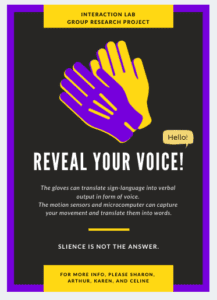My definition of interaction
I define interaction as a cyclic process where two actors alternately receive and respond to the message, which is base on the definition given by Crawford in The Art of Interactive Design. Receiving and responding message can also be described as listening, thinking, and speaking, which in computer terms are called: input, processing, and output, according to Introduction to Physical Computing written by O’Sullivan and Igoe. More specifically, in the process of interaction, both parties receive and process information and give corresponding responses, which stimulates a new round of information transmission and thus forms a cycle.
Two interactive projects
1. Camera Restricta
https://www.creativeapplications.net/objects/camera-restricta/
The Camera Restricta project fits my definition of interaction well. It is a tool for taking unique photographs—by pressing the button on the camera, users can check whether too many photos have been taken at the location. If so, the camera retracts the shutter and blocks the viewfinder, and users can’t take any more pictures here. The two actors in this project are the user and the camera. First, the user conveys a message that he wants to check the number of pictures taken here by pressing the button, which is also called INPUT. And then the camera receives the task and detects the number of pictures taken nearby with an induction system, which is PROCESSING. Then it shows the number to the user and makes other reactions such as retracting the shutter and blocking the viewfinder, which is OUTPUT. These reactions is another message conveyed to the users—he shouldn’t take photos here, so the user changes another place and repeats this reaction cycle. We can see the two actors here influence each other by constantly exchanging information, thus creating a cyclic and dynamic process.
2.Shanshui-DaDA
I think the Shanshui-DaDA project doesn’t align with your definition of interaction. Shanshui-DaDA is AI assisting human creator in drawing Chinese ink wash landscape painting. Once the user draws some lines on the screen, it converts them into landscape paintings. In my opinion, it doesn’t involve a circulation of information transmission. It is a unilateral process, which only involves users’ input and Shanshui-DaDA’s output. Also, the output doesn’t stimulate the user’s next reaction.
Our group project—Reveal Your Voice
Partner:
Karen Zhang, Arthur Gu, Anna, Celine Yu
As the first step, our group of five gathered together and basically unified the concept of interaction. Then we brainstormed how the world would be in 2119. We divided the problems that people may face in 2119 into several categories: Environment, Disability, Obesity and so on. Inspired by Celine, we came up with the sign-language interpretation gloves, which could translate sign-language into audible voices. We wanted to make the project not only have strong interaction and practicability but also more meaningful. The gloves are more than an interactive device—it is a gift for the mute to regain their lost voice. Through our performances, we can see that mute people usually live in a silent and oppressive environment. There always seems to be a barrier between them and others, which is not their fault. If such a device exists in the future, people’s disability could be solved. We can make up for the disabled’s pity with the technology, and provide more possibilities for them. Although this technology hasn’t been implemented and promoted, it is likely that it will be perfected and applied in 2119.
Apart from being meaningful, the device perfectly shows my understanding of interaction. Based on my definition of interaction, the two actors in the device are the user and the gloves. When the person uses sign-language (INPUT), the sensors on the gloves receive the hands’ moving trajectory information and the processor processes the information (PROCESSING), and then expresses it in a voice that can be heard (OUTPUT). Once the device outputs the sound, the mute users can confirm the successful transmission of information based on the feedback of the device (the sound they hear) and then make a new round of stimulation, which constitutes a cyclic process. That is exactly my definition of interaction. Moreover, the meaning of interaction for this device is not limited to the interaction between mute people and itself. It also promotes interpersonal communication and helps mute people gain confidence in daily life. Through the design process of the group project, I think I have a deeper understanding of interaction and have gained the ability to apply it in the following courses.
